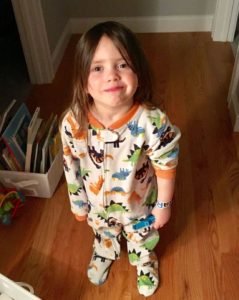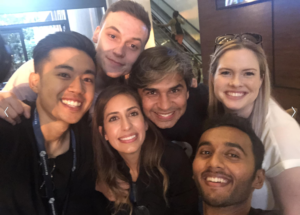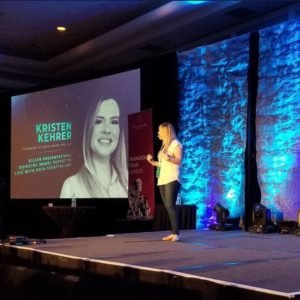Workshops:
On Thursday I attended "Uplift Modeling and Uplift Prescriptive Analytics: Introduction and Advanced Topics" by Victor Lo, PHD. This information really resonated with me. Dr. Lo spoke about the common scenario in Data Science where you'll build a model to try and predict something like customer attrition. You'd maybe take the bottom three deciles (the people with the highest probability of cancelling their subscription, and do an A/B test with some treatment to try and encourage those customers to stay.
In the end, during analysis, you'd find that you did not have a statistically significant lift in test over control with the usual methods. You end up in a situation where the marketers would be saying "hey, this model doesn't work" and the data scientist would be saying "what? It's a highly predictive model". It's just that this is not the way that you should be going about trying to determine the uplift. Dr. Lo spoke about 3 different methods and showed their results.
These included:
- Two Model Approach
- Treatment Dummy Approach
- Four Quadrant Method
Here is the link to his ODSC slides from 2015 where he also covered these 3 models (with similar slides): here
I've experienced this scenario before myself, where the marketing team will ask for a model and want to approach testing this way. I'm super excited to use these methods to determine uplift in the near future.
Another workshop I attended was "R Packages as Collaboration Tools" by Stephanie Kirmer (slides). Stephanie spoke about creating R packages as a way to automate repeated tasks. She also showed us how incredibly easy it is to take your code and make it an R package for internal use. Here is another case that is applicable currently at my work. I don't have reports or anything that is due on a regular cadence, but we could certainly automate part of the test analysis process, and there are currently ongoing requests asked of Analytics in our organization that could be automated. Test analysis is done in a different department, but if automated, this would save time on analysis, reduce potential for human error in test analysis, and free up bandwidth for more high value work.SWAG:
Although conference swag probably doesn't really need a place in this article, Figure Eight gave out a really cool little vacuum that said "CLEAN YOUR DATA". I thought I'd share a picture with you. Also, my daughter loved the DataRobot stickers and little wooden robots they gave out. She fashioned the sticker around her wrist and wore it as a bracelet. 3 year olds love conference swag:

 Keynote:The keynote was Thursday morning. I LOVED the talk given by Cathy O'Neil, a link to her TED talk is here. She spoke about the importance of ethics in data science, and how algorithms have to use historical data, therefore, they're going perpetuate our current social biases. I love a woman who is direct, cares about ethics, and has some hustle. Go get em' girl. I made sure to get a chance to tell her how awesome her keynote was afterwards. And of course I went home and bought her book "Weapons of Math Destruction". I fully support awesome. Summary:I had an incredible time at the ODSC conference. Everyone was so friendly, my questions were met with patience, and it was clear that many attendees and speakers had a true desire to help others learn. I could feel the sense of community. I highly suggest that if you every get the opportunity to attend, go! I am returning to work with a ton of new information that I can begin using immediately at my current job, it was a valuable experience. I hope to see you there next year.
Keynote:The keynote was Thursday morning. I LOVED the talk given by Cathy O'Neil, a link to her TED talk is here. She spoke about the importance of ethics in data science, and how algorithms have to use historical data, therefore, they're going perpetuate our current social biases. I love a woman who is direct, cares about ethics, and has some hustle. Go get em' girl. I made sure to get a chance to tell her how awesome her keynote was afterwards. And of course I went home and bought her book "Weapons of Math Destruction". I fully support awesome. Summary:I had an incredible time at the ODSC conference. Everyone was so friendly, my questions were met with patience, and it was clear that many attendees and speakers had a true desire to help others learn. I could feel the sense of community. I highly suggest that if you every get the opportunity to attend, go! I am returning to work with a ton of new information that I can begin using immediately at my current job, it was a valuable experience. I hope to see you there next year.


 And although I enjoy a good dance party (more than most), there were a number of reasons why this conference (in particular) was so memorable.
And although I enjoy a good dance party (more than most), there were a number of reasons why this conference (in particular) was so memorable.
 Yoga + Dancing + Music + Fantastic EnergyBoth Saturday and Sunday morning I attended yoga at 7am. To be fully transparent, I have a 4 year old and a 1 year old at home. I thought I was going to use this weekend as an opportunity to sleep a bit. I went home more tired than I had arrived. Positive, energized, and full of gratitude, but exhausted.Have you ever participated in morning yoga with 20-30 data scientists? If you haven't, I highly recommend it.It was an incredible way to start to the day, Jacqueline Jai brought the perfect mix of yoga and humor for a group of data scientists. After yoga each morning you'd go to the opening keynote of the day. This would start off with dance music, lights, sometimes the fog machine, and a bunch of dancing data scientists. My kind of party.The energized start mixed with the message of community really set the pace for a memorable experience.Thought provoking keynotes Ben Taylor spoke about "Leaving an AI Legacy", Pablos Holman spoke about actual inventions that are saving human lives, and Tarry Singh showed the overwhelming (and exciting) breadth of models and applications in deep learning. Since the conference I have taken a step back and have been thinking about where my career will go from here. In addition, Kirill encouraged us to think of a goal and to start taking small actions towards that goal starting today.I haven't nailed down yet how I will have a greater impact, but I have some ideas (and I've started taking action). It may be in the form of becoming an adjunct professor to educate the next wave of future mathematicians and data scientists. Or I hope to have the opportunity to participate in research that will aid in helping to solve some of the world's problems and make someone's life better.I started thinking about my impact (or using modeling for the forces of good) a couple weeks ago when I was talking with Cathy O'Neil for the book I'm writing with Kate Strachnyi "Mothers of Data Science". Cathy is pretty great at making you think about what you're doing with your life, and this could be it's own blog article. But attending DSGO was the icing on the cake in terms of forcing me to consider the impact I'm making.Basically, the take away that I'm trying to express is that this conference pushed me to think about what I'm currently doing, and to think about what I can do in the future to help others. Community is king in more ways than one.ClosingI honestly left the conference with a couple tears. Happy tears, probably provoked a bit by being so overtired. There were so many amazing speakers in addition to the keynotes. I particularly enjoyed being on the Women's panel with Gabriela de Queiroz, Sarah Nooravi,
Yoga + Dancing + Music + Fantastic EnergyBoth Saturday and Sunday morning I attended yoga at 7am. To be fully transparent, I have a 4 year old and a 1 year old at home. I thought I was going to use this weekend as an opportunity to sleep a bit. I went home more tired than I had arrived. Positive, energized, and full of gratitude, but exhausted.Have you ever participated in morning yoga with 20-30 data scientists? If you haven't, I highly recommend it.It was an incredible way to start to the day, Jacqueline Jai brought the perfect mix of yoga and humor for a group of data scientists. After yoga each morning you'd go to the opening keynote of the day. This would start off with dance music, lights, sometimes the fog machine, and a bunch of dancing data scientists. My kind of party.The energized start mixed with the message of community really set the pace for a memorable experience.Thought provoking keynotes Ben Taylor spoke about "Leaving an AI Legacy", Pablos Holman spoke about actual inventions that are saving human lives, and Tarry Singh showed the overwhelming (and exciting) breadth of models and applications in deep learning. Since the conference I have taken a step back and have been thinking about where my career will go from here. In addition, Kirill encouraged us to think of a goal and to start taking small actions towards that goal starting today.I haven't nailed down yet how I will have a greater impact, but I have some ideas (and I've started taking action). It may be in the form of becoming an adjunct professor to educate the next wave of future mathematicians and data scientists. Or I hope to have the opportunity to participate in research that will aid in helping to solve some of the world's problems and make someone's life better.I started thinking about my impact (or using modeling for the forces of good) a couple weeks ago when I was talking with Cathy O'Neil for the book I'm writing with Kate Strachnyi "Mothers of Data Science". Cathy is pretty great at making you think about what you're doing with your life, and this could be it's own blog article. But attending DSGO was the icing on the cake in terms of forcing me to consider the impact I'm making.Basically, the take away that I'm trying to express is that this conference pushed me to think about what I'm currently doing, and to think about what I can do in the future to help others. Community is king in more ways than one.ClosingI honestly left the conference with a couple tears. Happy tears, probably provoked a bit by being so overtired. There were so many amazing speakers in addition to the keynotes. I particularly enjoyed being on the Women's panel with Gabriela de Queiroz, Sarah Nooravi,  This article is obviously an over simplification of all of the awesomeness that happened during the weekend. But if you missed the conference, I hope this motivates you to attend next year so that we can meet. And I urge you to watch the recordings and reflect on the AI legacy you want to leave behind.I haven't seen the link to the recordings from DataScienceGo yet, but when I find them I'll be sure to link here.
This article is obviously an over simplification of all of the awesomeness that happened during the weekend. But if you missed the conference, I hope this motivates you to attend next year so that we can meet. And I urge you to watch the recordings and reflect on the AI legacy you want to leave behind.I haven't seen the link to the recordings from DataScienceGo yet, but when I find them I'll be sure to link here. 

